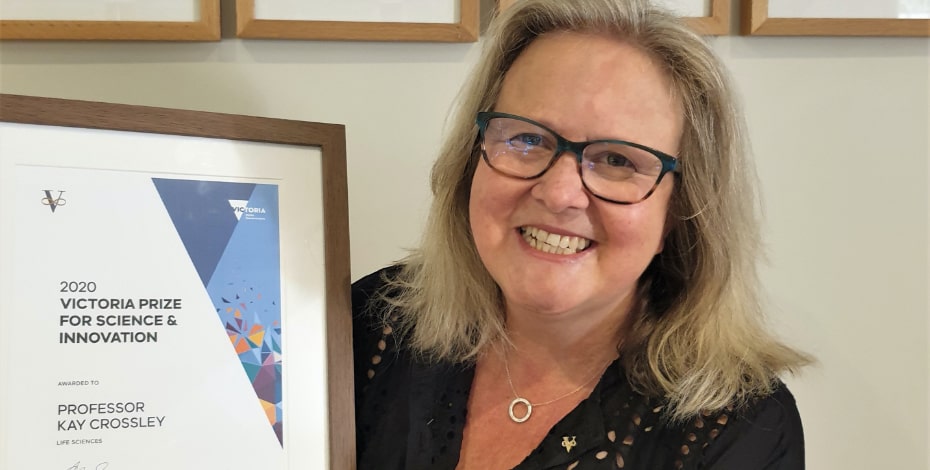
Kay leads the way to support women

Having been awarded Victoria’s highest scientific honour, the 2020 Victoria Prize for Science and Innovation (Life Sciences), Kay Crossley understands some of the challenges and rewards for women in research and what it means for the physiotherapy profession.
Had she not been nominated by two of her peers, Professor Kay Crossley would most likely not have been in contention to win the 2020 Victoria Prize for her work in advancing research focused on young people with early-onset osteoarthritis.
Like many other physiotherapists and researchers of her gender, Kay admits that she is far more comfortable working at her desk than she is in accepting accolades.
But having stepped into the limelight to accept the prestigious award and its $50,000 prize in November, Kay now hopes to encourage other women within the profession to task themselves to move outside of their comfort zone to seek recognition for their work and their contributions to their workplaces, teams or within any collaborative settings.
‘I think it’s important to say that women have to get out of being where we feel safe and comfortable,’ Kay says.
‘If we don’t put our voices out there then they’re not going to be heard. I say, “see, hear and empower”. It is important that women are seen, that they are heard and that they feel empowered, which will only happen if we have systems and structures to promote and support these ideals’.’
On the eve of International Women’s Day on 8 March, which has a theme this year of ‘Choose to Challenge’, the professor of physiotherapy and director of the La Trobe Sport and Exercise Medical Research Centre says she faced her own significant challenges when undertaking her PhD after working as a sports physiotherapist at the Olympic Park Sports Medicine Centre in Melbourne for many years.
‘I had a couple of probably unique challenges, one was I was still working with the Australian track and field team.
'During my PhD I was the Australian team physio at two world championships, a Commonwealth Games, a world junior championship and eventually the Olympic Games.
'So I had to navigate time away from home and my study as we used to be on the road for quite some time.
‘Then I made the interesting decision to start a family. I didn’t quite get the timing right and ended up having my daughter with six months to go in my PhD.
'Even now the university system and the scholarship system isn’t great for people having children during their PhD, but back then it was less easy to navigate.
'Being pregnant, having a baby and trying to finish the writing up of your PhD was particularly challenging. I handed in when my daughter was about six months old, so it was hard trying to get enough sleep to be able to think and write and do it well.’
The APA Sports and Exercise Physiotherapist says the key to making it all work for her was finding good mentors (she names Professors Kim Bennell, Sally Green, Rana Hinman, Sandy Brauer Joan McMeekan, Gillian Webb, Ewa Roos and MayArna Risberg among her mentors), making sure to become part of a good and supportive research/university/work team, pushing aside self-limiting behaviours and acknowledging that there will be challenges to overcome.
‘In physiotherapy, we’re fortunate in a way where it’s not a male-dominated profession.
'But it doesn’t necessarily make it easier for women navigating through the elements of caring, whatever those elements look like,’ Kay says.
'The system won’t really support you very well. It’s so important that you get the team around you that will support you through.
‘There are huge rewards in academia. A lot of people go into physiotherapy because they like helping people—academia allows you to do that. But you do need to be a bit selfish about your own needs and ambitions and try and find people who will help nurture you.’
Kay says that throughout her 35-year career she has found physiotherapy, as a profession, to be supportive of women, citing some examples of female physiotherapy leaders.
‘The first physios I knew who were doing research were Jill Nosworthy and Cathy Nall, real leaders in the field. And lot of heads of physio in hospitals are women and a lot of heads of schools of physio are women.
'I think we have some good role models as female leaders in physiotherapy.’
© Copyright 2024 by Australian Physiotherapy Association. All rights reserved.





